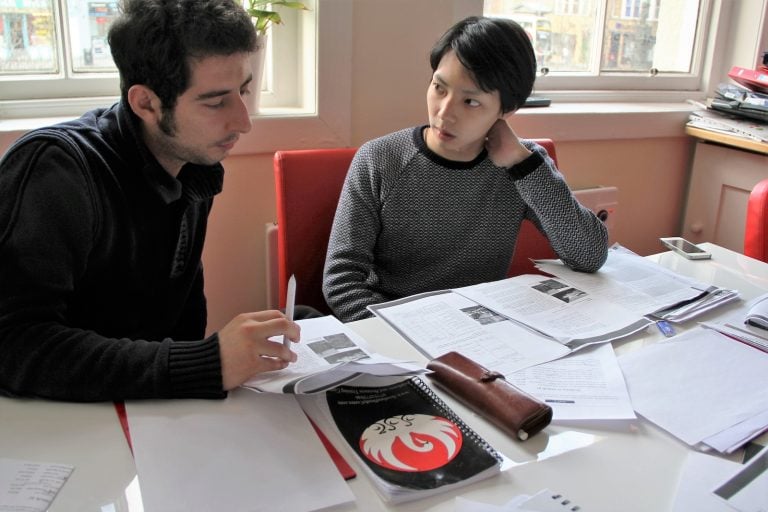
The idea that “Japanese people can’t speak English” is a common belief held by many people. There are numerous articles written by foreigners living in Japan that attempt to explain why Japanese people are terrible at speaking English. Japanese people have also produced books and articles on the matter. Nonetheless, in both the United States and Japan, I have met Japanese people who are capable of carrying out conversations in English. However, it’s common for these people to insist that they “can’t speak English” even as they are having a conversation in English. For many Japanese ESL speakers, “can’t speak English” is more of an attitude towards English than a measure of language proficiency. Where does this idea come from? What does it mean to be able to communicate in English? Can we conceive of a way of thinking about communication that allows Japanese ESL speakers to feel that they can speak English?
Anxieties about Pronunciation and Other Mistakes

ESL speakers in Japan tend to have fairly high levels of anxiety about their English pronunciation. There are a number of sounds in English that don’t exist in Japanese, so it is understandable that it might require some effort for Japanese ESL learners to produce them. However, having difficulty with a handful of English sounds is far from the sole source of anxiety that Japanese ESL speakers have about making pronunciation mistakes. ESL learners in Japan often study in competitive environments where there is a sense of shame attached to making mistakes. The fear of making mistakes in front of peers is so strong that some Japanese ESL speakers report feeling more comfortable speaking English with native English speakers than other Japanese people. They feel as if their accent and any mistakes they make are being judged more harshly by fellow ESL speakers. Striving for a “perfect” accent is a shared goal amongst a large number of ESL speakers in Japan, which may be why they feel more self-conscious around each other than native English speakers.
Of course, Japanese ESL speakers have anxiety surrounding grammatical mistakes as well. But the anxiety surrounding pronunciation errors seems to be more apparent. I’ve heard Japanese people who completed English language graduate degree programs express anxiety about giving presentations in English. Despite being highly proficient in English, they were afraid that no one would understand them because of their accent. Many Japanese ESL speakers do not see themselves as being adequate English speakers unless they can achieve the goal of speaking with the idealized accent of a native speaker.
Discrimination Against Proficient English Speakers
There are more Japanese people who are highly proficient (i.e. capable of reading college level books, performing business negotiations) in English than one might think. Many of these highly proficient English speakers are 帰国子女 “kikokushijyo” (returnee children) who lived abroad for part of their childhood. A large number of 帰国子女 “kikokushijyo” are native or near native speakers of English. Despite the prevalence of people who aspire to have “perfect” pronunciation in English, there is a substantial amount of discrimination against 帰国子女 “kikokushijyo” in Japanese society. It is not uncommon for bilingualism to be associated with a loss of Japanese identity. Japanese people who are highly proficient English speakers are often thought of as “less Japanese”. Some parents fear that even if their children grow up in Japan, learning English will cause them to lose some of their Japaneseness and adopt a more global sense of self. Childhood is a critical period of development, which may be why learning other languages as a child is so strongly associated with being different. Nonetheless, there are adults who return to Japan after spending years abroad and experience similar discrimination. These ideas about Japanese identity lead many people, especially those who became bilingual as children, to try to avoid drawing attention to their English skills in order to avoid bullying and ostracization. They also discourage ESL learners from trying to further their language skills and practice having conversations in English.
Rethinking Communication in English

From examining the fear associated with making mistakes and discriminatory attitudes towards proficient English speakers in Japanese society, we can see where the idea that “Japanese people can’t speak English” comes from. When it is seen as shameful to make pronunciation errors but being a highly proficient English speaker can be a source of ostracization, it’s much easier to stick to speaking Japanese. Attitudes towards English in Japanese society need to change in order for more ESL speakers to become confident in their English abilities.
Fostering an environment where communication, rather than perfection, is the goal can help Japanese ESL learners realize that they can speak English. It doesn’t require a high level of proficiency to have basic conversations. Even if a learner makes some (or even a lot) of grammatical mistakes, if they can get their point across, they’re speaking English! When it comes to anxieties about pronunciation mistakes, it may be helpful for English teachers to point out that there’s no one “perfect accent” for ESL learners to strive for. Native English speakers’ pronunciation and accents vary greatly by region. For instance, an American English speaker might have a bit of trouble understanding a Scottish person. However, people often get used to different accents and pronunciation patterns after interacting with a person for some time. This doesn’t require any special effort on the part of either speaker. Being open minded and willing to listen and interact is usually all it takes to get used to unfamiliar speech patterns. If ESL students are taught that most people will understand them and that it’s okay to have a “different” sounding accent, they may feel more empowered to speak English.
Still, if discrimnation against 帰国子女 “kikokushijyo” and other highly proficient English speakers doesn’t end, there’s little motivation for ESL learners to further their language skills and become more confident in speaking English. Japanese identity doesn’t have to be incompatible with bilingualism. As the existence of 帰国子女 “kikokushijyo”, mixed ethnicity Japanese, and other minorities show, there are a myriad of ways to be Japanese. Recognizing that Japanese people who can speak English are still Japanese may be the biggest step towards challenging the idea that “Japanese people can’t speak English”.
Written by Julia Nagai.














